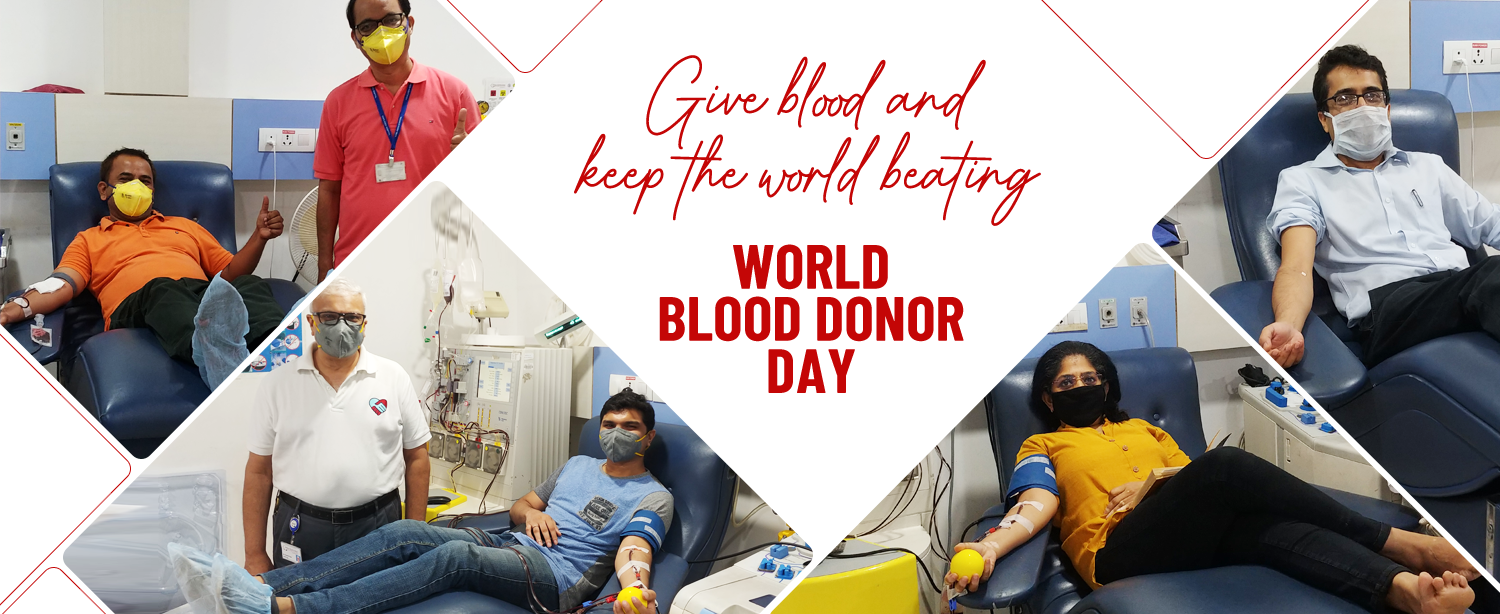Imagine yourself in a medical emergency where finding the right blood group becomes crucial to survival of your loved one. There is no substitute for blood, it cannot be made or manufactured. Generous blood donors are the only source of blood for patients in need of a blood transfusion. This “World Donor day” let each one of us pledge to donate blood regularly. It is essential and helps keep the world pulsating by saving lives and improving other’s health. A healthy individual can donate blood every 3 months.
How Blood Donation helps?
- Crucial during disasters or emergency situations.
- Helps patients who lose blood during major surgeries.
- People who have lost blood because of a gastrointestinal bleed.
- Helps women who have serious complications during pregnancy or childbirth.
- Is lifesaving for Cancer patients.
- Is required for regular blood transfusions for thalassemia and sickle cell disease patients.
India relies heavily on transfusions due to a higher prevalence of blood-borne diseases. Our country is witness to 1200 road accidents every day and 60 million trauma induced surgeries are performed each year. The 230 million major operations, 331 million cancer-related procedures like chemotherapy and 10 million pregnancy complications require blood transfusion.
Who can Donate Blood?
Most people can give blood if they are in good health.
What makes you Eligible:
- Any donor, who is healthy, fit, and not suffering from any transmittable diseases can donate blood.
- Donors must be above 18 years of age and should weigh minimum 50 kgs.
- The Donor’s Haemoglobin level must be 12.5 minimum.
- Pulse rate must be between 50 to 100mm without any irregularities.
- Should have normal blood pressure levels.
- Body temperature should be normal.
What makes you Non-Eligible:
- Patients of cardiac arrest, hypertension, kidney disease or epilepsy.
- Consumption of alcohol within the last 24 hours.
- Being HIV positive.
- Having a cold, flu, sore throat, or any other infection.
- Pregnant women and breastfeeding mothers cannot donate blood.
Blood Donation: side effects
You may have some temporary side effects after donating blood, these include:
- In case you have a bit of bleeding from the spot where you donated, raise your arm and apply pressure to that spot for a few minutes.
- If you are feeling lightheaded, lie down for a few minutes until you feel better.
- If you have bruising in that area, use an ice pack on it.
- Hydrate yourself with more and more fluids for 24-48 hours after you donate blood.
- Don’t work out or do any hard physical activity for 24 hours after giving blood.
Myths and facts
Donating blood is a simple, safe way to help save lives. Don’t let these myths stop you from donating blood. Also, if you have any particular medical condition speak to you doctor about your eligibility to donate blood instead of making assumptions. Donating blood provides a lifesaving gift. It’s a simple thing to do and can make a big difference in the lives of others. Here are some common myths about donating blood and the real facts:
Myth: Blood donation is painful.
Fact: The only pain you’ll feel is the quick prick of the needle when it is inserted. The area may be slightly sore afterward, but any discomfort you feel is minor compared to this noble deed of blood donation.
Myth: It is unsafe to donate blood with my medications.
Fact: Most medications do not interfere with the process of blood donation. However, it is best to speak to your doctor in advance to find out if you are eligible for blood donation.
Myth: Blood donation makes me weak.
Fact: Only about one pint of blood is collected. The average adult has approximately 10 pints of blood, and after donating, your body makes new blood to replenish what is lost. Keep yourself hydrated, your body will replace lost fluids within a few hours and the red and white blood cells in a few days.
Myth: I can contract HIV or other infections.
Fact: A new sterile needle is used each time and is then immediately discarded. Stringent infection control practices are being followed to make this process safe and ensure minimal risk of infection to the donor.
Myth: Diabetics cannot donate blood.
Fact: Having diabetes cholesterol does not disqualify you from donating blood, as long as you are otherwise healthy. However, you must ensure that your blood sugar levels are under control before a blood donation.
Donating blood in a pandemic is important than even before as India is facing a huge blood deficit. You can safely donate blood just as you step out for other tasks, make sure that you follow these precautions at all times:
- Take an appointment to avoid crowds.
- Practise double masking.
- Carry a hand sanitizer and use it frequently.
- Maintain social distancing while at the hospital/ clinic.
The Department of Transfusion Medicine at Kokilaben Dhirubhai Ambani Hospital is equipped with cutting-edge technology and employs innovative processes for processing and screening of blood and its components. We understand your apprehensions for blood donation and maintain strict infection control practices throughout the entire process. Our team of doctors and nurses ensures the sterile use of equipments at all times and makes sure the patient feels comfortable. Call our Blood Bank on 022-30937293 to donate blood. For further information, please visit: https://www.kokilabenhospital.com/departments/clinicaldepartments/transfusionmedicine/blooddonation.html


